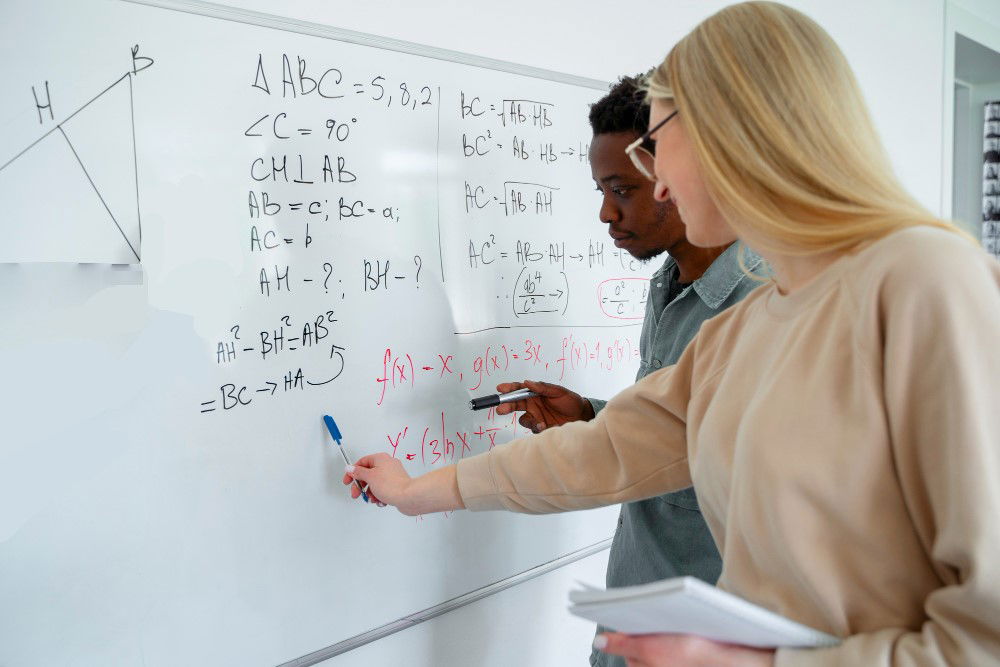The Complete IGCSE Maths Study Guide

Feeling unsure about how to approach your IGCSE Maths exam? This guide covers the syllabus, exam format, formulas, study techniques, common mistakes, and FAQs. It’s built to help students of all levels study smarter and feel more confident.
Need help with IGCSE Maths?
Introduction
IGCSE Maths is a core subject in secondary education and forms the foundation for many future academic and career paths. It’s required in nearly every school system and often one of the most heavily tested subjects in IGCSEs.
There’s much to cover with topics like algebra, geometry, probability, and statistics, so steady practice is key. This guide provides clear explanations, practical tips, and trusted resources to help you revise effectively at any stage of your preparation.
What Is Covered in the IGCSE Maths Syllabus?
The IGCSE Maths syllabus includes various numerical, algebraic, and analytical topics. While different boards may word their topics differently, most cover the same core concepts.
Number and Algebra
This is where many students begin. These topics are key to everyday problem-solving and come up often in Paper 1 and Paper 2. Here’s what you’ll usually be expected to know:
- Four operations with integers, decimals, fractions, and percentages
- Ratios, proportions, and rates of change
- Laws of indices and simplifying algebraic expressions
- Solving linear and quadratic equations
- Expanding and factorising expressions
- Working with sequences and patterns
Getting a strong grasp on number and algebra early helps set a stable base for the rest of the course.
Geometry and Trigonometry
This section tests your understanding of shapes, measurements, and spatial reasoning. Topics often include:
- Properties of angles and polygons
- Transformations: reflections, translations, rotations, and enlargements
- Pythagoras’ Theorem and trigonometric ratios
- Area and perimeter of 2D shapes
- Surface area and volume of 3D shapes
- Circle theorems and constructions
Ensure you learn how to label diagrams accurately and apply angle rules correctly.
Statistics and Probability
Statistical understanding and the ability to interpret data are essential for exams and everyday life. You’ll study:
- Data collection and sampling methods
- Representing data with graphs: bar charts, histograms, pie charts, and more
- Calculating averages: mean, median, mode
- Range and interquartile range
- Probability of combined events, including tree diagrams and Venn diagrams
Practice is key, especially with real data and applied scenarios.
Functions and Graphs
Many students find this section tricky at first. You’ll need to work with:
- Plotting and interpreting linear, quadratic, exponential, and reciprocal graphs
- Identifying coordinates, intercepts, and gradients
- Understanding function notation
- Solving equations graphically
- Transformations of functions
Graph work demands attention to detail, so neatness and accuracy will help you score better.
By understanding each topic area in the IGCSE Maths syllabus, you’ll be better equipped to plan your revision and confidently tackle every type of question.
How the IGCSE Maths Exam Works
Exams are split into calculator and non-calculator papers. Understanding how each paper works is vital for building your study and time management strategy.
Paper 1: Non-calculator
This paper focuses on mental strategies and written methods. You can expect:
- Arithmetic with decimals and fractions
- Algebraic manipulation and basic solving
- Geometry questions involving diagrams and calculations
- Estimations and checking answers without a calculator
It’s essential to practise non-calculator techniques early and often.
Paper 2: Calculator Paper
Your calculator can help with lengthy arithmetic in this paper, but understanding the method is still essential. You’ll be assessed on:
- Multi-step algebraic problems
- Graphs and coordinates
- Compound interest, bearings, and loci
- Statistical analysis and interpreting results
Don’t rely solely on the calculator to give the correct answer. Marks are awarded for method as well as accuracy.
Time, Structure, and Scoring
Each paper is usually between 1 hour and 2 hours long. Most boards offer two to three papers, depending on the tier and the specific syllabus. You’ll be given a total mark for each paper, often out of 80 or 100, and these scores are added up and converted into a grade boundary for your exam board.
Grading and Exam Boards
Here’s a brief overview of the different boards offering IGCSE Maths:
- Edexcel: Offers Foundation and Higher tiers, graded 1–9. Great online resources and consistent structure.
- Cambridge (CIE): Offers Core and Extended papers, graded G to A*. Used widely outside the UK.
- Oxford AQA: Similar to UK AQA but adapted for international students. Graded 1–9.
- AQA: Common in UK schools, includes optional coursework in some versions.
Your school usually selects the board, so use the correct past papers and syllabus.
Essential Formulas You Need to Know
Many students lose easy marks because they don’t remember or apply the correct formula. Most exams require you to memorise these, so it’s important to practise them regularly.
Geometry, Algebra, Area/Volume, Probability Rules
These are some of the most used formulas in IGCSE Maths:
- Area of triangle: ½ × base × height
- Area of circle: π × r²
- Circumference of circle: 2πr
- Volume of cuboid: length × width × height
- Volume of cylinder: π × r² × height
- Pythagoras’ Theorem: a² + b² = c²
- Trigonometric ratios: sin = opposite/hypotenuse, cos = adjacent/hypotenuse, tan = opposite/adjacent
- Quadratic formula: x = [−b ± √(b² − 4ac)] / 2a
- Probability: favourable outcomes ÷ total outcomes
When and How to Apply Them
Here’s a strategy to apply formulas effectively:
- Identify the type of question. Read carefully and determine whether the question concerns area, volume, probability, or something else.
- Choose the correct formula. Match the topic with the formula you’ve memorised. Look for keywords that point to what method is needed.
- Substitute values carefully. Plug in the given numbers with attention to detail. Double-check your substitutions to avoid careless errors.
- Label your answers with correct units. Always include units like cm², m³, or degrees when needed. Marks can be lost for missing or incorrect units.
- Show every step clearly. Write out your working in a logical, neat order. Clear steps may still earn you marks even if your final answer is wrong.
Use flashcards or apps to memorise the formulas and test yourself regularly. Mastering these essential formulas and knowing when to apply them will give you a strong advantage in the IGCSE Maths exam.
Effective Preparation Techniques for Maths
Success in IGCSE Maths comes from consistent effort. Cramming in the last month won’t work if your understanding is shallow. Here’s how to revise effectively throughout the year.
Ensure Solid Maths Foundations Early On
If you have a full year before your IGCSE Maths exam, this is the best time to build a strong foundation. Establishing consistent habits early will make a big difference later on. Here’s what you can do:
- Review your classwork weekly to keep concepts fresh and reinforce your understanding
- Spend extra time on weak topics so you can improve gradually without pressure
- Start practising past paper questions by topic to get used to how questions are asked
- Schedule short revision sessions with a tutor to get support on areas you find difficult
By starting early and building these habits, you’ll feel more confident, less stressed, and better prepared as the exam approaches.
Practice-Based Learning (Problem Sets)
The best way to improve in Maths is to solve problems regularly. Use your teacher’s topic-wise question banks, structured revision guides, or problem sets. Resources like Save My Exams provides well-categorised question sets with worked solutions to help you improve your accuracy.
Flashcards for Formulas and Rules
Create flashcards with one formula on the front and an example question on the back. Use them during commutes, quick breaks, or short daily reviews. Test yourself or quiz with a friend to make revision more engaging. Just 5 minutes a day can help reinforce key formulas and build strong recall over time.
Identifying Weak Areas with Mock Tests
Take mock tests at home under timed conditions. After each one:
- Review mistakes and understand why they happened
- Categorise errors: Was it a formula, method, or misread question?
- Practise those types of problems again
Work through 3 to 4 mocks per month closer to the exam for best results.
Practice Past Papers and Examiner Reports
Start with untimed past papers to get familiar with the question types. Then begin practising under exam conditions. Examiner reports from boards like Cambridge and Edexcel highlight where students commonly lose marks. Use them to avoid those same mistakes.
Consistent practice, targeted revision, and the right study tools can significantly affect how confidently you approach the IGCSE Maths exam.
Common Mistakes and How to Avoid Them
Learning what not to do is just as valuable as knowing what to do.
Misreading the Question
Even if you understand the method, it’s easy to lose marks by overlooking small details like units, decimal places, or specific instructions such as “estimate” or “explain.” To avoid this, remember to underline key parts of the question as you read.
Not Showing Working Clearly
Even if you use a calculator, show your steps. You won’t get full marks without clear line-by-line working, logical order of steps, and final answer boxed or circled. Don’t assume the examiner will fill in the gaps for you.
Calculator Overreliance
Many students type the entire question into a calculator without understanding what it means. This is risky because:
- One button mistake gives the wrong answer
- Method marks are lost if you don’t show steps
- You can’t check reasonableness without estimating
By staying alert to these common mistakes and practising careful, clear working, you can avoid unnecessary mark losses and improve your overall exam performance.
Final Tips: Stay Consistent and Practise Under Timed Conditions
With less than three months, it’s time to focus on timed revision. Aim to complete two full past papers each week, review your mistakes carefully, and keep a log of common errors. Prioritise complex topics and work on them consistently, but remember to take breaks and get enough rest to avoid burnout.
Even with your best efforts, some topics can still feel overwhelming. This is where an experienced IGCSE Maths tutor can make a big difference. TutorsPlus provides personalised lessons to help you understand challenging concepts and strengthen your skills.
“Meera is an amazing tutor. She has helped me tremendously with many challenging problems and explains in a way that makes other problems easier to solve.”
“Andrea explains things very well and is very engaged. She listens to me and figures out where my weaknesses lie and helps me well.”
FAQs About IGCSE Maths
What’s the difference between Core and Extended?
Core covers the basics with grades up to C. Extended includes harder content and offers up to an A*. Choose based on your school’s recommendation.
Which calculator is allowed in the exam?
Check your board’s rules, but most accept scientific calculators like the Casio fx-991EX.
How can I revise more effectively in the last month?
Focus on past paper timing, reviewing common errors, and memorising formulas. Use structured resources and mock exams.
What grade do I need to study A-Level Maths?
Generally, you’ll need a Grade 6 or higher. Some schools may ask for a 7 if you plan to take Further Maths.
Can I take IGCSE Maths online?
Yes, there are online courses and exams offered through private centres. Just make sure it’s an approved Cambridge or Edexcel centre.
How is IGCSE Maths different from national curricula?
IGCSE Maths includes a broader range of international contexts and problem-solving. It’s often more challenging than standard GCSE Maths.
Feel free to contact TutorsPlus at +41 22 731 8148 or to learn how our tutors can support you. Success in IGCSE Maths is achievable with the right preparation, resources, and mindset. Keep practising, stay consistent, and believe in your progress. You’ve got this!








